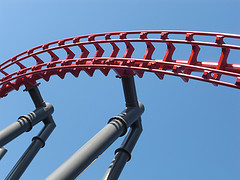Should You Be Worried About The Safety Of Amusement Park Rides?
After a woman was thrown from a roller coaster and killed last Friday at Six Flags Over Texas, thrill seekers might be feeling a bit hesitant to indulge in their favorite loop-de-loops. While it’s natural to think about safety in the aftermath of such an unfortunate event, those in the know say injury and death from such rides are rare.
Consider this: According to the National Safety Council Research and Statistical Services Group for the International Association of Amusement Parks and Attractions (otherwise known as the longest group name I’ve typed in recent memory), there were around 1,415 injuries on amusement park rides in 2011.
But take into the account that people took about 1.7 billion rides in the same year, reports USA Today.
This doesn’t take into account traveling carnival rides, it’s worth noting, just the amusement parks that don’t go anywhere.
The Consumer Product Safety Commission also looked at rides at parks and carnivals, and found that an estimated 37,154 people were sent to the hospital with injuries in 2011. Of those, 35,9777 were released and 1,177 were admitted or died of their injuries.
While there aren’t firm numbers on only how many deaths there were in 2011, one widely-reported incident was at a theme park resort in Upstate New York, when an Iraq War veteran died on a coaster. He’d lost both his legs to a roadside bomb during the war, but still was permitted to ride even though he didn’t have his prostheses on and signs said riders must have two legs. He came out of his seat and was killed after 150-foot fall.
That being said, according to the Centers for Disease Control, here are a few other more likely ways to injure yourself and end up hospitalized than riding a roller coaster: Unintentional fall; poisoning, “other,” motor vehicle, struck by something or against something, motorcycles, overexertion, other transportation, being a pedestrian. In other words, it’s not a stretch to say walking is more likely to land you in a hospital than riding a roller coaster is.
It’s natural to worry about bad things happening after hearing about highly publicized incidents like the one last Friday, as it’s kind of like when there’s a plane crash and you get that spike of nerves the next time you fly. It’s the freak accidents that get the most buzz, but it isn’t likely it’ll happen to you.
How safe is a roller coaster? [USA Today]
Want more consumer news? Visit our parent organization, Consumer Reports, for the latest on scams, recalls, and other consumer issues.


